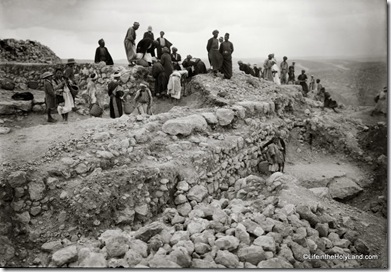How quickly one’s legacy can be re-defined. In his day, William Foxwell Albright was regarded with the highest esteem by scholars in biblical and archaeological studies. In recent decades, his approach is usually dismissed with an disparaging, how-could-anybody-be-so-naive elevation of the nostrils.
The “Albright School” is equated with everything wrong in biblical archaeology. Even the term “biblical archaeology” is rejected. Albright certainly made significant mistakes, but I surmise that fifty years hence, the hindsight of time will prove less gracious to Albright’s critics than to the man himself.
It’s thus refreshing to read a recent appreciation of Albright’s work by Thomas Levy and David Noel Freedman, published at Bible and Interpretation. Freedman was a student of Albright, and he co-wrote a biography of his teacher in 1975. The current piece looks like it was prepared for publication, and its copyright attribution to the National Academy of Sciences suggests that it may have been written in connection with Levy’s induction into the academy last year.
I recommend reading the biography, but this article is a good, brief summary of his life and scholarly achievements. The article includes a chronology of his life and a selected bibliography. I note some interesting facts from the article to stimulate your interest:
- Albright’s left hand was crippled in a childhood farm accident.
- When he was ten years old, he received as a present the History of Babylonia and Assyria, by Professor R. W. Rogers.
- Albright spent 18 hours a day for three days writing terrifying exams for the Thayer Fellowship on Syriac, Arabic, Hebrew, Greek, Latin, French, and German; Hebrew Bible Literature and Criticism; geography; archaeology; history; and epigraphy.
- He mastered more than 26 ancient and modern languages.
- He translated and published a text from the time of the Dead Sea Scrolls ten years before the Qumran scrolls were discovered.
 Albright’s excavations at Tell Beit Mirsim, 1926
Albright’s excavations at Tell Beit Mirsim, 1926 Source: Library of Congress, LC-matpc-05732
From a forthcoming collection from www.LifeintheHolyLand.com
2 thoughts on “The Legacy of William F. Albright”
How many archaeological scholars today have learned even 5 languages, let alone mastered two dozen? I always find it ironic that modern scholars love predecessors who agreed with their views (no matter how wrong they are) while disparaging others who used the same methods but came to conclusions they don’t like.
It is becoming obvious that the more a theologian is disrespectful and unbelieving to Scriptures, the more they are hailed among their peers. This makes me wonder: is it still about understanding God or has it become about finding a proof to justify existing unbelief?